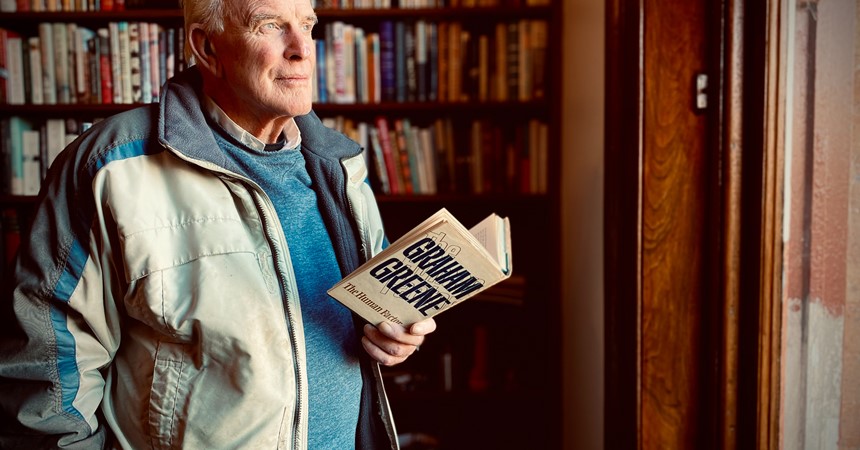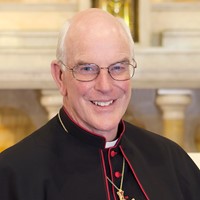We are at our best as human beings when we turn our minds to the good of the whole community and the good of others, and not just to the interests of our own group.
June 2014
And it is invigorating, as I've been trying to say, when you find yourself in the midst of that young church. They want to do better than we have done, and so they should. But they do still need something of 'the shock of the old'. At the very least, they need to be astonished at what Jesus actually said and did, and to know something of what he and the Spirit have inspired men and women to do with their lives down the ages. Then they see how they have a place in that story, how they are called to write their chapter. Lord knows, they've got all the gifts and the generosity of spirit. I've seen it.
December 2016
In the end, Christianity knows two ways of triumphing over adversity. One is to overcome the problem, to succeed against the odds, to stop the suffering. Christ cured the sick and drove out demons, right? The other way to triumph over adversity is remain faithful, to remain decent and human, in spite of insuperable afflictions. Christ died on the Cross praying for his enemies. Sometimes we need the courage to fight, at other times the patience to endure gracefully. At present, it's a bit of both.
June 2020
However much we might wish to pretend that our lives are guided by reason, choice or even our higher spiritual nature, our moods are not. We need to be able to name the things that affect us: things like the weather, like the need of a holiday, like the time since we've relaxed with friends, like our anxiety before some big event. We need to call these things what they are, lest we call them something else, or lay the blame on someone else. The classic, 'It's not you, it's me' should sometimes be, 'It's not either of us, it's three wet days in a row'. We just have to own up to humanness: we are affected by this stuff.
June 2012
Our lives are often enough marked by attempts to get everything together, to build the perfect city, the perfect moral order, perfect family, perfect children, to have everything 'just so'. And yet, when we do get close to that, when everything is arranged for our ease and comfort, we get restless. It is when things don't work out as we'd hoped that our best qualities come out. We love people and places and things in spite of their flaws and failings, after all, or it is not love at all… We learn and grow from mistakes more than from success. We celebrate that part of disasters, from Gallipoli to bushfires, that brought out the best in us. We are closest to the people with whom we went through the worst of times. We manage to forgive. Our great redeeming quality as human beings, it seems, is not that we achieve perfection in our lives, which we do not, but that we manage, at times, to live so graciously within the mess.
October 2012
We live at a time when people question what makes life worth living. We tend to undervalue the things that money can't buy and to have exaggerated hopes that the things we can buy will one day deliver happiness. We go to extraordinary lengths to make our bodies last a few years or months longer, but we won't think or talk about death itself, almost superstitiously believing that if we ignore it, it will go away. Yet we are still faced with the ancient human questions: What gives meaning to life? What is a good life? What might be worth dying for? What is death, and is it all there is in the end? Christians believe that the life, death and rising of Jesus are highly significant to our deepest human ponderings. We call his history simply 'the Good News'.
April 2016
Now, I've been asked many times since I first arrived eight years ago this month, how will the church win back trust? I believe I've always said something to the effect that, in the end, it will be the witness of the good and faithful lives of ordinary believers that will win people's respect. The kindness, honesty, staying power and faithfulness of "ordinary" Catholic people will have its impact on how people outside see Catholics and will gradually wear away the hostility built up by the present public image of the church. It's like the way that even the thickest of our fellow citizens will come to realise that Muslims can't be all that bad, despite the shock-jocks, because Mustafa next door is a great guy. Seeing real, good people simply living their faith, evidently sustained by their prayer and their community, breaks down barriers and stereotypes.
June 2019
To the Catholics out there, I say this. Try to figure out what the election is all about, despite all the rhetorical distractions about 'leadership, lies, and where's the money coming from’.
There are policies out there: they just won't be mentioned in the campaigns. And vote for what will serve the common good. Not the interest of the greatest number, let alone the interest of the most interest groups, starting with yours: the common good. Vote for what will best serve to make Australia a society (and, only secondarily, an economy) we can be proud to be a part of. We may not have elections for grown-ups anymore, but we can still choose to vote like grown-ups.
July 2013
Why, then, has the offer of Church 'sanctuary' for asylum-seekers struck such a chord in the community? Not for the old reasons, I would suggest, that mercy is a good thing and churches are 'holy' places. Rather, it is because a good part of the Australian people recognises that in this instance our law is not good, not fair and not just, and thinks that someone, anyone, even the Church, should stand up against it. The people do still have a moral sense about how innocent strangers are treated, and the leaders of our major parties would be wise not to ignore this. For twenty years they have been afraid to appeal to that decency in Australians. Now might be the time. What else can it mean, that so many Australians believe asylum-seekers actually need 'sanctuary', sanctuary from our own government?
March 2016
… 'good' people can be highly unpleasant when they forget the basic Christian fact that we're all in this together, relatively good or appallingly bad, we all alike depend on God's inexhaustible capacity to forgive our failings for the sake of Christ. And sometimes bad people see that, see their human frailty, rather more clearly.
December 2013
But the priesthood is a hands-on ministry, a face-to-face ministry. It's a bedside ministry. It's conversation in the presbytery kitchen over coffee. 'All ministry is relationship', Paul Hanna used to say when I was with him at Mt Druitt, and of course that's right. The trick for us, in the new order, is to have parish life organised, but without spending too much time on organising. The priesthood is about being with people. It gets boring if you're just oiling the machine. Those are two realities that don't change.
February 2015
There is a religious side to this, of course, as there is to everything human. A surprising number of people seem to be unable to take a 'No' from God. I'm in the habit of saying that they confuse God with Santa Claus, thinking that if they've been good, and they're asking for something they really, sincerely want, God should give it to them. If He doesn't, they sulk and won't talk to Him or they'll take in life. be answer their bat home' and not believe in Him anymore. That's very different from St Paul who prayed three times with God to take away the 'thorn in his side' but had to be content with the answer, 'My grace is sufficient for you'. What he learned from that 'No' was that his very difficulties showed him more clearly how God was with him: 'When I am weak, then I am strong.' And, of course, one hardly need mention the resounding 'No' that Jesus got from God in Gethsemane to his prayer, 'Father, if it be possible, let this cup (of suffering and death) pass me by...' Learning to take 'No' for an answer, without acting like a spoilt child, is an important part of human and religious maturity, I'd suggest.
May 2012
For the past 15 years or so, the Diocese has gone through an excruciating public examination of its failures and, for the most part, the criticism levelled by media has been warranted. As I have said previously, the forensic examinations conducted into the Diocese by both the Cunneen Special Commission and the Royal Commission into Institutional Responses to Child Sexual Abuse were extraordinarily confronting, entirely justified and immeasurably valuable to the Diocese. Thanks to the past 15 years, the Diocese has the opportunity to build a future with a comprehensive and transparent understanding of past failures and a multi-generational commitment to ensure that such failures will not reoccur. As part of this commitment, we will continue to acknowledge our past and endeavour to offer support and services to promote healing to those who were affected by child sexual abuse.
September 2019
I know we are a society obsessed with security, with locks and alarms and fences on everything. But it's one of the national neuroses I think the Church should try to rise above. Churches should be open. People don't just want houses of prayer, quiet places of reflection, between 10 and II on Sundays. The pope and I would like the church communities of this diocese to lead the way in being a church of open doors. Literally and metaphorically.
October 2014
… 'good' people can be highly unpleasant when they forget the basic Christian fact that we're all in this together, relatively good or appallingly bad, we all alike depend on God's inexhaustible capacity to forgive our failings for the sake of Christ. And sometimes bad people see that, see their human frailty, rather more clearly.
December 2013
We face many challenges as a church in the years ahead, it's true. I've been asked to name them on a number of occasions, by the press and others, and it's possible to come up with quite a substantial list. But that is the normal state of human affairs, isn't it?
The question is, what resources do we have to meet those challenges? And the greatest resource of the church, the bedrock of the church, is its local parish communities.
The heart of my work as a bishop is to support and encourage the initiatives of our local communities to 'spread the Good News' and to 'love one another'. Some may need more 'encouragement' than others, perhaps. But we are far from having to start from scratch. I am liking a lot of what I see.
August 2011























































































